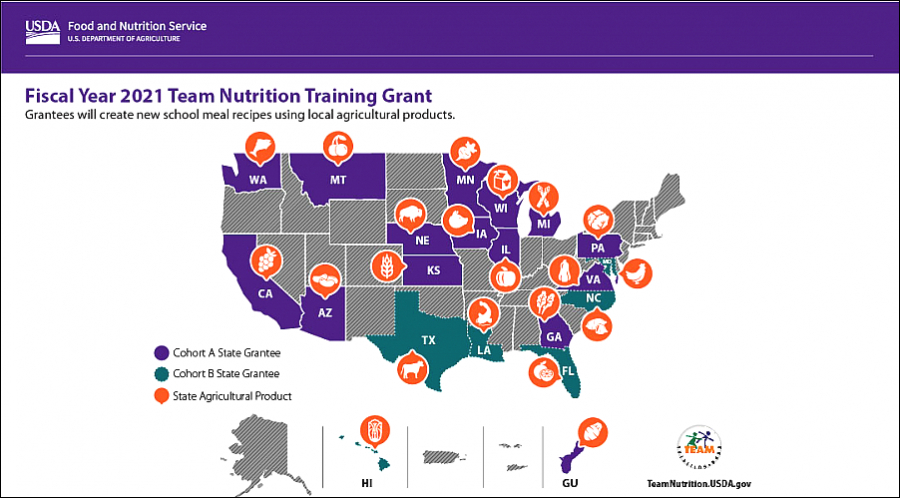
On Aug. 16, 2021, we announced the additional award of approximately $1.4 million in fiscal year (FY) 2021 Team Nutrition Training Grants for School Meal Recipe Development to six state agencies that administer the School Breakfast Program and/or National School Lunch Program (i.e., Cohort B). We previously awarded over $4.1 million to 15 states (i.e., Cohort A) in October 2020, resulting in a total of approximately $5.5 million awarded to 21 states in FY 2021.
These grants are assisting states in helping schools offer meals supported by recipes that utilize local agricultural products and reflect local food preparation practices and taste preferences.
For more information, please contact TeamNutrition@USDA.gov.
Recipients of the FY 2021 Team Nutrition Training Grants for School Meal Recipe Development, Cohort B:
Florida
The Florida Department of Agriculture and Consumer Services (FDACS) will build on the success of their Lunch180 initiative to collect culturally diverse recipes featuring local foods. A statewide competition will identify the five recipes for further development. Each recipe will include Florida agricultural commodities as a main ingredient, such as citrus fruits, snap/green beans, tomatoes, bell peppers, lettuce, sweet corn, green and yellow squash, carrots, cucumber, celery, strawberries and broccoli. Selected recipes will reflect foods and food preparation practices from Florida’s Hispanic/Latino, Black, Asian, Native Hawaiian, American Indian and Alaskan Native communities. The final five standardized recipes will be featured in the FDACS Lunch180 Standardized Recipe Cookbook and the Division Chef will show how to prepare them in instructional videos available to schools.
Hawaii
The Hawaii State Department of Education (HIDOE) will implement the Increase Access to Local Produce Through Standardized Recipes and Training project to collect cultural recipes from families across the island chain through a recipe contest. The final eight student-selected recipes will include local agricultural products and cultural preparation methods reflecting the state’s diverse Polynesian and Pan-Asian influences and will include Hawaiian, Filipino, Chuukese, Korean, Samoan and Vietnamese-inspired dishes. Each recipe will utilize local agricultural products such as Asian cabbage, Asian sweet potato, Kabocha squash and beef. A School Community Engagement Liaison will develop educational nutrition materials for students and their families about the recipes and local agricultural products.
Louisiana
The Louisiana Department of Education (LDOE) will conduct the Louisiana Festival of Flavors (FOF) standardized recipe campaign to engage regional school nutrition leadership in the development of 16 standardized school meal recipes. These recipes will reflect regional and cultural taste preferences of the state’s African American, Cajun, Creole and Asian communities. The campaign will educate students on the foods produced in Louisiana and their nutritional benefits. Local agricultural products featured in the recipes will include sweet potatoes, catfish, brown rice, whole grain cornmeal, pecans, winter squash, citrus fruits, broccoli and dairy products. LDOE will award and administer sub-grants to eight school districts to develop the recipes.
Maryland
The Maryland State Department of Education (MSDE) conducted early research with Maryland school nutrition leaders regarding student taste preferences. Based on this feedback, the state will focus their recipe development activities on entrée salads, entrée bowls and vegetable side dishes using local kale, collards, mushrooms, radishes, bok choy, sweet potatoes, cucumbers, carrots, broccoli, cauliflower, chicken and blue catfish as primary ingredients. Maryland local education agencies (LEAs) serve students from a wide range of religious and cultural backgrounds and the state’s early research indicated an interest in more Southern, European, Indian and Islamic recipes. Three LEAs will be awarded sub-grants to develop, test, standardize and menu recipes and the MSDE’s local partners, Prince George’s County Community College and Maryland SNAP-Ed, will provide expertise, oversight and training to the sub-grantees. Maryland farmers, fishers and Cooperative Extension agents will participate in educational opportunities at schools to expand student knowledge of local foods served on their school menu.
North Carolina
The North Carolina Department of Public Instruction (NCDPI) will build on the success of the existing North Carolina Junior Chef Competition to develop six standardized school lunch entrée recipes reflective of the tastes and cultural preferences of their students. Recipes will reflect Pacific Islander, Indian, Asian, Hispanic and African American dishes. They will also feature North Carolina-grown ingredients including sweet potatoes, winter squash, dark-green leafy vegetables (collard greens, kale, mustard greens, turnip greens, romaine lettuce, spinach, Swiss chard), cabbage (red or green), beans and peas and wheat. State agency staff will work with the student junior chefs, local school nutrition professionals and graduates of the North Carolina K-12 Culinary Institute to develop, standardize, verify, pilot, test and finalize the recipes. Nutrition education and promotion of local foods will be provided using innovative lesson plans, videos, podcasts and social media.
Texas
The Texas Department of Agriculture (TDA) plans to develop five standardized school meal entrée recipes made with locally-produced ingredients including rice, black-eyed peas, eggs, beef and mushrooms. Recipes will reflect regional Southern, Southwestern, Tex-Mex and Coastal food preferences. The TDA plans to hire a culinary instructor who will provide video demonstration, hands-on training and oversight to five school food authorities (SFAs), which will each receive sub-grants to host recipe contests and student taste-testing events. Local agricultural producers will share information with students about how the local foods are grown and the path they take before appearing on the school lunch tray.

